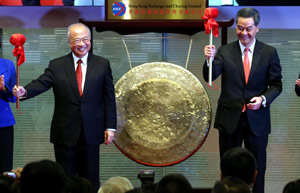Space law ready for liftoff
Updated: 2014-11-18 07:37
By ZHAO LEI(China Daily)
|
||||||||
Legal framework seen as key to fostering industry and protecting national assets
 |
 |
"As China puts more and more assets into space, conflicts involving our increasing number of activities, limited resources and space debris have become noticeable," Tian Yulong, secretary-general of the China National Space Administration, told reporters on the sidelines of an international workshop on space law that opened in Beijing on Monday.
Officials and experts from more than 30 nations and international organizations are taking part in the four-day event, which was hosted by the United Nations Office for Outer Space Affairs, the Asia-Pacific Space Cooperation Organization and the administration.
"The safety of our assets in space depends largely on the enforcement of international space law and our domestic law that governs space activities," Tian said, adding that the laws also play an important role in managing and fostering space-related industries, which have been enjoying rapid growth in China.
"The market for space-related technologies, data and intellectual property is expanding very fast and has a promising future, so now is the right time for us to make and implement a space law to regulate the market," Tian said.
Currently, China is the only space power in the world with no space law. By contrast, more than 30 countries, including the United States, Russia and France, have long had a comprehensive legal framework to guide space exploration. Those countries' space-related industries have benefited greatly from the enforcement of their respective space laws, experts say.
China has established a set of regulations to govern its space activities, ranging from the launching of spacecraft and registration of space objects to measures to mitigate and reduce space debris, said Xu Dazhe, director of the Chinese administration. He pledged to cooperate closely with lawmakers to accelerate the introduction of a comprehensive space law, which has been included in the national legislative agenda.
The proposed space law is set to regulate the planning of space activities, to control the use of resources and technology transfers, to guarantee the sustainable development of China's space exploration and to promote international cooperation in space-related fields, Tian said.
Hu Hao, a senior expert with China's lunar exploration program, said that space law is one of the pillars of the country's "soft power", and the government should draw up and publish the law as soon as possible.
"Furthermore, compared with the past-where space activities only involved government departments-an increasing number of institutes and business entities have now been active in the field, with the rapid expansion of a space-related market that requires a foundation of law on which to restructure the current management system," he said.
Bao Weimin, a space technology researcher and political adviser to the government, said China's space activities are administered by a number of government bodies and industry organizations, and a body of law should establish an integrated management mechanism and make their responsibilities clear.

 Sports moments of the week: Nov 17-23
Sports moments of the week: Nov 17-23
 42nd American Music Awards held in Los Angeles
42nd American Music Awards held in Los Angeles
 A retrospection of righted wrongs
A retrospection of righted wrongs
 Top 10 kinds of foreigners in China
Top 10 kinds of foreigners in China
 Anxious Ferguson waits for grand jury's decision
Anxious Ferguson waits for grand jury's decision
 Mascots from Olympic, Paralympic games arrive in Rio
Mascots from Olympic, Paralympic games arrive in Rio
 China's boxer Zou Shiming defeats unbeaten Thai
China's boxer Zou Shiming defeats unbeaten Thai
 Mountains echo to the sound of music
Mountains echo to the sound of music
Most Viewed
Editor's Picks

|

|

|

|

|

|
Today's Top News
US aids in return of economic fugitives
80% of China's rich aspire to overseas education
International luxury hotels expand in China
Disney, SMG expand partnership
LA mayor visits Beijing
Subway-push victim mourned in Chinatown
China, Pacific island nations boost ties
Media reveals aircraft carrier base spying case
US Weekly

|

|







